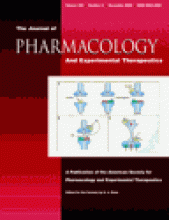Abstract
Interleukin (IL)-5 regulates the growth, differentiation, and activation of eosinophils. When activated, eosinophils release an array of proinflammatory and cytotoxic products and act as prominent effector cells in the process of allergic inflammation. Depriving eosinophils of IL-5 may therefore represent a viable approach to treat allergic disorders. This study describes the identification of R146225, a novel six-substituted azauracil derivative, as a potent, orally active inhibitor of IL-5 biosynthesis, capable of reducing pulmonary eosinophilia in mice. In vitro, R146225 inhibited IL-5 protein formation by activated human whole blood (IC50 = 34 nM), human peripheral blood mononuclear cells (IC50 = 24 nM), and murine spleen cells (IC50 = 6 nM). In contrast, the compound enhanced generation of interferon-γ and had little or no inhibitory effect on the production of IL-2 and IL-4. Reverse transcription-polymerase chain reaction analysis of stimulated whole blood cells indicated R146225's ability to down-regulate IL-5 mRNA expression. In vivo p.o. administration of R146225 (2.5 mg/kg) to mice before an i.v. anti-CD3 antibody challenge reduced IL-5 but enhanced interferon-γ serum levels, without affecting IL-2 and IL-4 production. Analogous to the in vitro results, R146225 suppressed splenic IL-5 mRNA expression, while message levels of the other cytokines remained unchanged. Moreover, p.o. dosing of R146225 (0.6–2.5 mg/kg) dose dependently reduced the pulmonary accumulation of eosinophils induced in mice by an intranasal instillation ofCryptococcus neoformans. Based on these data, R146225 may be useful in the therapy of eosinophil-driven allergic conditions.
Footnotes
-
Send reprint requests to: Jean Van Wauwe, Janssen Research Foundation, Turnhoutseweg 30, 2340 Beerse, Belgium. E-mail:jvwauwe{at}janbe.jnj.com
- Abbreviations:
- IL
- interleukin
- PHA
- phytohemagglutinin
- PBMC
- peripheral blood mononuclear cell
- CFU
- colony-forming unit
- ELISA
- enzyme-linked immunosorbent assay
- IFN-γ
- interferon-γ
- PCR
- polymerase chain reaction
- Th cell
- helper T cell
- Received April 19, 2000.
- Accepted July 4, 2000.
- The American Society for Pharmacology and Experimental Therapeutics
JPET articles become freely available 12 months after publication, and remain freely available for 5 years.Non-open access articles that fall outside this five year window are available only to institutional subscribers and current ASPET members, or through the article purchase feature at the bottom of the page.
|






